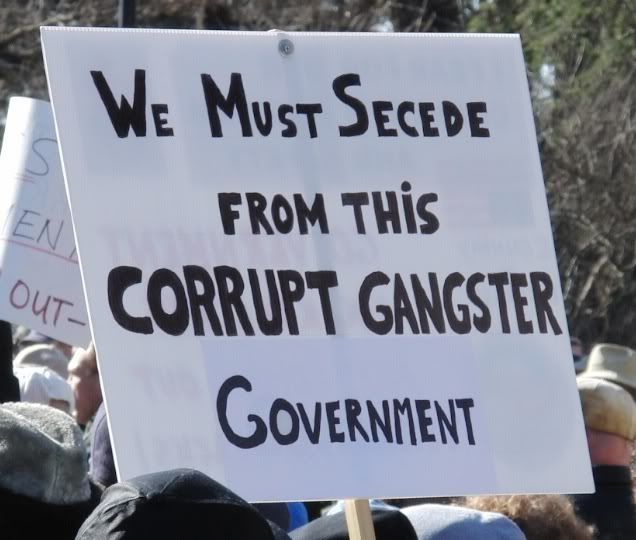Friday, January 29, 2010
If at first you don't secede …
You probably didn't read about it in the mainstream media (I knew nothing of it), but on January 9 some 2,000 South Carolina residents held a protest rally at the state capitol in Columbia. Among the demands: secession from the United States. (Tip o' the lid to Rebellion Blog.)
This isn't another "save your Confederate money, boys, the South will rise again" joke. Splitting up the United States is on the table again.
It makes sense. There is no longer a "United" States. The name is an anachronistic fiction. For 40 years we have had a culture war unlikely ever to be resolved. It is like a marriage with, in the legal phrase, "irreconcilable differences."
Part of the population wants a Euro-style government-directed state, open borders, legal anti-white discrimination, welfare-state expansion financed by higher taxes and borrowing, an apologetic foreign policy, and the rest of the program represented by the Failed Messiah and his radical Democrat followers. Very well, let them have it. With this proviso: they must give up any and all claims to another part of the country where those with opposing views can live by their own values.
If we are to avoid civil war or tyrannical repression, we must enact a constitutional amendment that provides a clear legal path for states that wish to secede from the federal leviathan to do so.
To those who say this would present immense practical problems — true. But as long as individual liberty remains, people will overcome practical problems. Yes, some people who found themselves on what was for them the wrong side of a legal divide would have to choose between accepting it or shifting house to a jurisdiction more to their liking. We are the most mobile nation in the world. People move all the time to what they think will offer them a better environment culturally or economically.
An immense anger in much of the country has built up against the Washington oligarchy and the federal bureaucracy, a millipede with a foot in every business and activity. As David Foster writes, "Obama, with the complicity of Pelosi and Reid, is in the process of creating an economy and a society in which the primary factor affecting the success of every individual and every business is the attitude of the federal government toward that individual or business."
That anger will not be assuaged by an election. At most changing the complexion of Congress will result in endless gridlock. At worst, well, who knows? The number of once-free countries that became dictatorships throughout history is almost countless, the most recent examples being the European states that became Communist puppet regimes for the Soviet Union after World War II.
It works the other way, too. People who feel alienated from their own government, who think they've been pushed too far, can destroy civil government in their wrath. Charles I dissolved the British parliament over what he saw as irreconcilable differences between it and the monarchy. A civil war ensued, and a few years later King Charles was kneeling on a scaffold for his head to be severed. The French revolution quickly devolved into the reign of terror and set the stage for Napoleon's permanent war state and his crowning himself as emperor.
This country's founders, despite important differences with one another, managed an inspiring feat. The devised a form of government with not only checks and balances among different branches, but a federal system in which states could counterbalance the inevitable tendency of a central government to accumulate power. It worked brilliantly for more than two centuries. It does not work today. We have a president who can call on the wealth and patronage needed to bribe members of Congress to fall into line. We have a Supreme Court and other federal courts with a power never granted to them in the Constitution, to nullify laws passed by the people's representatives or the people's own referendums, the nullification based on the politics of the court.
Can we return to a limited federal government and a balance of powers? I doubt it; but if there is any chance of that happening, the right of states to secede will be a strong force for such a restoration.
Subscribe to:
Post Comments (Atom)





5 comments:
The case for a national divorce was well (and humourously) argued in a "Letter from a Law Student" at www.cassyfiano.com/2009/03. I have a healthy scepticism, at best, about any politician, but Rick Perry rose a few notches in my estimation when he mentioned secession last year. Read the compilation "The Anti-Federalist Papers" for further philosophical grounding.
Early American settlers found what worked was the freedom for each individual to think, imagine, create, build and change the environment with their sweat, even disturbing the established and accepted way things are done without fear of punishment, exemplified in Ayn Rand’s writings. That was America, and what set her apart from all other nations, as cited in Save Pebble Droppers & Prosperity at Amazon and claysamerica.com. Individual freedom caused local government, close to the governed within a day’s horseback ride. The governed ruled, and they could change abusive government in Town Halls, voting or by vigilante movements, much like the Tea Party movement today. It is our tradition. Claysamerica.com
A Constitutional amendment to permit states to secede might be something that both people on the Left and Right could agree on, actually. One time I said to some very liberal friends of mine, "the problem is that neither side gets to totally try out their ideas so that it's clear whether those ideas work or not." They agreed with that. Maybe we could agree to some sort of split with an agreement that people will have a certain amount of time to change their minds about which part they want to live in.
The US Constitution, which replaced the Articles of Confederation, is the agreement by which the several states entered into union with one another. It is the document which "constitutes" the union. If it is widely determined (i.e. by the popular will) that the constitution has been nullified by a tyranical government, which ignores or openly tramples it's most important provisions, then the union itself IS dissolved. There is no contractual obligation if the contract is voided.
I don't think the constitution is dead yet. But it sure ain't healthy.
Thoughtful comments, all. Thank you.
Post a Comment